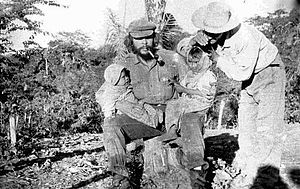Bolivian Insurgency (1966–1967)
| Bolivian Campaign | |||||||
|---|---|---|---|---|---|---|---|
| Part of Cold War | |||||||
 Che Guevara in Bolivia shortly before his death. |
|||||||
|
|||||||
| Belligerents | |||||||
| Ejército de Liberación Nacional |
|||||||
| Commanders and leaders | |||||||
|
|
|
||||||
| Strength | |||||||
| 29 Bolivians 25 Cubans 3 Peruvians 1 Argentine-Cuban (Che) 1 Argentine-German (Tania) |
600 Bolivian Rangers 24 Americans |
||||||
| Casualties and losses | |||||||
|
Che Guevara executed many killed or captured |
Dozens of soldiers killed | ||||||
| Teoponte Guerrilla | |||||||
|---|---|---|---|---|---|---|---|
| Part of Cold War | |||||||
|
|||||||
| Belligerents | |||||||
| Student Guerrilla |
|
||||||
| Commanders and leaders | |||||||
| Osvaldo Peredo |
Alfredo Ovando Candía (Until October 6) Juan José Torres (From October 6) |
||||||
| Casualties and losses | |||||||
| 67 Osvaldo Peredo exiled |
unknown | ||||||
The Ñancahuazú Guerrilla or Ejército de Liberación Nacional de Bolivia (National Liberation Army of Bolivia; ELN) was a group of mainly Bolivian and Cuban guerrillas led by the guerrilla leader Che Guevara which was active in the Cordillera Province, Bolivia from 1966 to 1967. The guerrilla was intended to work as a foco, a point of armed resistance to be used as a first step to overthrow the Bolivian government and create a socialist state. The guerrillas defeated several Bolivian patrols before they were beaten and Guevara was captured and executed. Only five guerrillas managed to survive and flee to Chile.
Che Guevara was committed to ending American imperialism, and he decided to travel to the Congo during its civil war to back the anti-capitalist guerrilla groups. Guevara's aim was to export the revolution by instructing local anti-Mobutu Simba fighters in Marxist ideology and foco theory strategies of guerrilla warfare. In his Congo Diary, he cites the incompetence, intransigence and infighting of the local Congolese forces as key reasons for the insurgency's failure. On November 20, 1965, in ill health with dysentery, suffering from acute asthma, and disheartened after seven months of frustrations and inactivity, Guevara left the Congo with the Cuban survivors (six members of his 12-man column had died). At one point, Guevara considered sending the wounded back to Cuba, and fighting in Congo alone until his death, as an ideological example. After being urged by his comrades and pressed by two emissaries sent by Castro, at the last moment, Guevara reluctantly agreed to leave Africa. In speaking about his experience in the Congo months later, Guevara concluded that he left rather than fight to the death because: "The human element for the revolution in the Congo had failed. The people have no will to fight. The revolutionary leaders are corrupt. In simple words... there was nothing to do." A few weeks later, when writing the preface to the diary he kept during the Congo venture, he began: "This is the story of a failure."
...
Wikipedia
